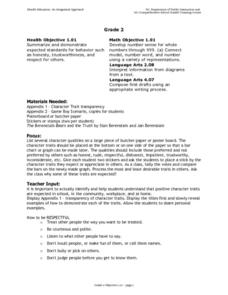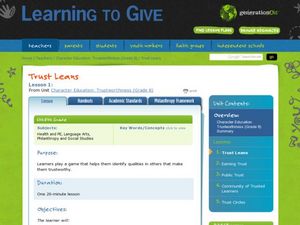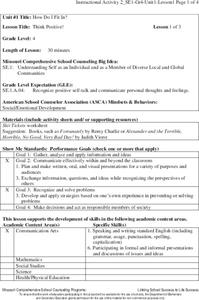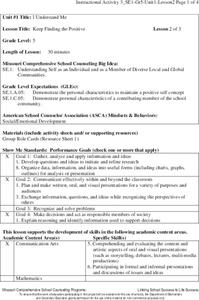Curated OER
Health Education: Earning Respect
Second graders explore how to earn respect. In this health lesson plan, 2nd graders summarize and demonstrate expected standards for behavior such as honesty, trustworthiness, and respect for others.
Curated OER
Character Development Through Reader's Theater
Ninth graders study a piece of literature, adapt it into a script and perform the piece to the class. Students practice reading their scripts. They use Inspiration software to create a multimedia presentation.
Curated OER
My Personal Best
Students persevere to build character. In this philanthropy lesson, students consider how to put forth their personal best in all areas of their lives as they participate in a physical activity.
Curated OER
Trust Leans
Students define trust and what it means to be trustworthy. In this good character lesson, students think of a person they trust and discuss what makes them trustworthy. Students pair up and complete trust leans. Students discuss the...
Curated OER
Community Helpers
Community Helpers are the focus of this sociology activity. Learners brainstorm the many different jobs done in their community, discuss why they are necessary, and think of ways they can be community helpers.
Curated OER
Understanding Points of View
Develop an understanding of point of view in your young learners. Read narrative stories to your class and discuss who the storyteller is. Point out different points of view and discuss new vocabulary in order to introduce this concept....
Curated OER
Teacher Appreciation Week (Elementary)
Primary writers will create a persuasive essay about Teacher Appreciation Week. Additionally, they will select a quote from a famous person and write a persuasive essay about how it relates to one of their favorite teachers. In the end,...
Curated OER
Welcome to My World
Elementary schoolers discuss what a community is, and what their community has to offer them. They create posters, or flyers for the different businesses or places in their community to place around their school. After the students have...
US Institute of Peace
Identifying Conflicts
When viewpoints collide, conflict arises. Can your pupils identify the components of conflict? The fourth in a series of 15 lessons about peacebuilding helps participants identify the underlying causes of conflict. Teams role play to...
Curated OER
Practice Book O
Whether you need resources for reading comprehension, literary analysis, phonics, vocabulary, or text features, an extensive packet of worksheets is sure to fit your needs. Based on a fifth-grade curriculum but applicable to any level of...
US Institute of Peace
Maintaining Trusting Relationships
What role does trust play in diffusing a tense situation? Young social scientists explore trust on a personal and global level during a lesson on peace and conflict. After participating in a trust sit, participants work in groups to...
US Institute of Peace
The Process of Negotiation
What does it take to be a great negotiator? Learners discover the factors that affect the negotiation process through group discussion and brainstorming. An installment in a series of peacebuilding activities compares the needs and wants...
US Institute of Peace
Identifying Your Conflict Style
How do you handle conflict? Individuals look inward to determine their own conflict style through group discussion and a short quiz. The sixth installment in a series of 15 conflict management lessons examines how our feelings and...
US Institute of Peace
What Does It Take to Be a Peacebuilder?
Is the spirit of peacebuilding already inside you? Scholars take a closer look at the characteristics of peacebuilders, past and present, in lesson 13 of a 15-part series. Individuals identify common traits of peacebuilders, then work...
US Institute of Peace
Organizations Working for Peace
From helping refugees to negotiating peace treaties, the peacekeepers of the world keep busy! Introduce young activists to the many individuals and organizations throughout the world that work daily toward peace. 14th in a series of 15...
US Institute of Peace
Perspectives on Peace
Much like a garden, once the seeds of peace are planted, they need to be tended! How can humankind make and keep peace? The second installment in a series of 15 peacebuilding activities focuses on different perceptions of peace. The...
US Institute of Peace
Nonverbal Communication
What is your body saying that maybe your words aren't? Scholars explore the vast world of the subtle, and not-so-subtle, nonverbal communication cues through group and individual work. Lesson seven in a series of peacebuilding exercises...
US Institute of Peace
Negotiation Role-Play
War-torn Kosovo is experiencing another crisis—thousands of broken-down cars clogging the damaged highways, making travel impossible. Which local auto shop owner will get the contract to clear the road for progress? After some research,...
US Institute of Peace
Mediating Conflict
Two's a negotiation, but three's a mediation! Demonstrate the differences between the two processes through a role-playing lesson plan. The activity familiarizes pupils with the role of a mediator and examines the types of situations...
US Institute of Peace
Defining Conflict
Conflict is everywhere—but is it avoidable? The first activity in a series of 15 peacebuilding lessons examines the nature of conflict at home, school, and across the world. Learners develop a definition of conflict through group work...
US Institute of Peace
Advanced Mediation Practice
What will become of the giraffes of Amali? Pupils participate in a large scale role-playing activity to study the art of conflict mediation. The lesson engages participants in the struggle between two countries and the animals caught...
US Institute of Peace
Becoming a Peacebuilder
"Be the change you wish to see in the world!" The 15th and final lesson in a peacebuilding series uses this quote from Gandhi to prepare pupils for their own action projects. Individuals research a global issue, then brainstorm a method...
Missouri Department of Elementary
Think Positive!
Following an attention-grabbing read-aloud, scholars brainstorm ways they can change negative thoughts into positive thoughts. Small groups plan and perform a skit that showcases one of the new ideas to uplift one's feelings....
Missouri Department of Elementary
Keep Finding the Positive
Group members take on roles to create a positive classroom community. Learners perform their role—leader, recorder, presenter, timekeeper, encourager, and collector—in preparation for a formal presentation of their positive thinking...
Other popular searches
- Character Education Honesty
- Character Education Respect
- Character Education Fairness
- Art Character Education
- Character Education Caring
- Character Education Play
- Character Education Lessons
- Character Education Clip Art
- Character Education, Honesty
- Art Character Education Esl
- Character Education Patience
- Character Education Compassion

























